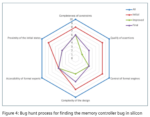Pratik Mahajan, Synopsys VC Formal R&D Group Director, kicked off an absorbing event featuring talks from multiple customers in Europe. He spent some time on formal signoff, an important topic that I’m still not sure is fully understood. Answering the questions “OK, we did a bunch of formal checking but how does that affect… Read More
Tag: bernard murphy
Formal for Post-Silicon Bug Hunting? Makes perfect sense
You verified your product design against every scenario your team could imagine. Simulated, emulated, with constrained random to push coverage as high as possible. Maybe you even added virtualized testing against realistic external traffic. You tape out, wait with fingers crossed for first silicon to come back. Plug it into… Read More
Reducing Compile Time in Emulation. Innovation in Verification
Is there a way to reduce cycle time in mapping large SoCs to an FPGA-based emulator? Paul Cunningham (GM, Verification at Cadence), Jim Hogan (RIP) and I continue our series on research ideas. As always, feedback welcome.
The Innovation
This month’s pick is Improving FPGA-Based Logic Emulation Systems through Machine Learning… Read More
SoC Integration – Predictable, Repeatable, Scalable
On its face System-on-chip (SoC) integration doesn’t seem so hard. You gather and configure all the intellectual properties (IPs) you’re going to need, then stitch them together. Something you could delegate to new college hires, maybe? But it isn’t that simple. What makes SoC integration challenging is that there are so many… Read More
RIP Jim Hogan – An Industry Icon
An unavoidable consequence of getting older is that more frequently our friends and colleagues unexpectedly leave us for their final venture. Jim Hogan, widely known and loved in the semiconductor industry, has passed on. He will leave a substantial hole in the hearts of many. Always ready with seasoned advice, a sympathetic … Read More
Quantum Tunneling for OTPs, PUFs: Higher security
I’ve had a number of enjoyable discussions with John East who ran Actel until it was acquired. (John and Actel devices also play an important role in my book, The Tell-Tale Entrepreneur.) This is relevant because Actel were well-known for their anti-fuse FPGAs. eMemory Technology, the subject of this blog, also produce an anti-fuse… Read More
Cadence Underlines Verification Throughput at DVCon
Paul Cunningham, CVP and GM of the System Verification Group at Cadence gave the afternoon Keynote on Tuesday at DVCon and doubled down on his verification-throughput message. At the end of the day, what matters most to us in verification is the number of bugs found and fixed per dollar per day. You can’t really argue with that message.… Read More
TECHTALK: Hierarchical PI Analysis of Large Designs with Voltus Solution
Power integrity analysis in large chip designs is especially challenging thanks to the huge dynamic range the analysis must span. At one end, EM estimation and IR drop through interconnect and advanced transistor structures require circuit-level insight—very fine-grained insight but across a huge design. At the other, activity… Read More
Finding Large Coverage Holes. Innovation in Verification
Is it possible to find and prioritize holes in coverage through AI-based analytics on coverage data? Paul Cunningham (GM, Verification at Cadence), Jim Hogan and I continue our series on research ideas. As always, feedback welcome.
The Innovation
This month’s pick is Using Machine Learning Clustering To Find Large Coverage … Read More
Arteris IP folds in Magillem. Perfect for SoC Integrators
Arteris IP and Magillem recently tied the knot, creating a merger of Network-on-Chip (NoC) and related Intellectual Property (IP) with a platform known for IP-XACT based SoC integration and related support. This is interesting to me because I’m familiar with products and people in both companies. I talked to Kurt Shuler, vice… Read More










